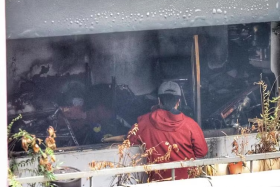Life old and alone
Just last month, he had a fall and cut his head.
Even though he bled profusely, all Mr Syn Chin Kok, 83, did was to use a towel to staunch the flow of blood.
That is just one of the things he has had to do because he is old and lives alone, notes the thin man with a wan smile.
When The New Paper on Sunday visited Mr Syn, we stumbled upon another old neighbour who was bleeding from his foot. He had trouble bending to reach the limb so this reporter helped him apply a band-aid.
Early last week, the Singapore Civil Defence Force hacked through the ceiling of a toilet after an 82-year-old man had his arm trapped down a pipe.
Mr Mohd Ani Mohd, who lives alone, had stuck his left arm down a shower drain to retrieve an object in the middle of the night. He wasn't found for 13 hours until his son came by with some food.
A 2009 survey by the then Ministry of Community, Youth and Sports showed that there were an estimated 35,000 elderly people living alone.
This is expected to rise to 61,000 in 2020, and 83,000 in 2030.
Mr Syn has been living on his own since his mother died in 2006. He has no siblings and has never been married.

He does have cousins, but they hardly visit. They have given him a flat-screen television, which sits in stark contrast to the rest of his utilitarian one-room flat in the Chinatown area.
There is a bed, a desk where he keeps an altar to his late mother, and a collection of his treasures: Two large, old and rusty speakers lie against a wall. A collection of old vinyl Chinese records stacked on the floor.
"My favourite singers," he says in Cantonese, gesturing to the vinyls. But he cannot recall when he last played them.

Old black-and-white photographs - remnants of his past as a studio photographer - litter the flat.
Mr Syn proudly gestures to a posed studio shot of himself and a young woman, who is dressed in graduation robes. He tells this reporter that she was the daughter of a studio owner he worked for.
"Thankfully, I can still move around on my own. I stock a lot of medicine at home, so I can use them when I need to," he says, pointing to bottles of Chinese medicated oil and packets of pills lying among knick-knacks on a table.

Mr Syn is on the Public Assistance Scheme, so he gets rental subsidies and full medical subsidies for visits to the outpatient clinic, said Dr Lily Neo, his MP for Tanjong Pagar GRC.
Dr Neo also said that as part of her ward, he receives hongbao giveaways, transport vouchers, and a $30 food and grocery voucher every month.
In addition, he has styrofoam boxes of food delivered to his door twice a day by volunteers from the Thye Hua Kwan Moral Society.
Despite getting financial aid and food delivered, it is clear that living alone still takes a toll.
When we first visited, Mr Syn was wary and would open the door only a crack. From within the darkened room, he watched, but eventually warming up to us so the team could chronicle his day.
And what is it like?
In the morning, he lights a round of joss sticks, offering them at a framed portrait of his mother and at two other altars in his home.
Then he has a simple breakfast - one cup of Milo and one slice of bread.

He occasionally shuffles to Chinatown (his legs and heart are weak) for his traditional Chinese medicine.
"I keep myself active by walking," he says.
Once in a while, he goes to sing karaoke at the Seniors Activity Centre in his neighbourhood. And the rest of the time?
Mr Syn falls silent.
"There is nothing much to do. I just sit here," he says, one leg propped up on the round stool he is sitting on.
It's clear that he misses human companionship.
"(My relatives) used to visit before my mum died. No one visits much now," he says with a shake of his head.
He talks animatedly in a melange of Cantonese, Mandarin and some Malay.
Despite his old age and humble abode, Mr Syn does not like to accept freebies.
When we gave him a packet of vegetarian food and a cold drink, he tried to find something in exchange for us.
He scoured through packets of coffee and Horlicks, despite our protests that it wasn't necessary.
Madam Fion Phua, 44, a business owner who organises door-to-door visits at one-room and two-room flats in the area, says she helped clean up Mr Syn's flat in April.
“My team and I also gave him a shower and we took him to cut his hair,” explains Madam Phua.
She says that people like Mr Syn are very vulnerable.
"They're old, their bodies are weaker, so they're more prone to falling down. Those who live alone have no one to take care of them, and it's even worse when they're blind and deaf, or when they're ill," she says.
She hopes that the Government can institute formal teams who can check on the old folks regularly.
Thankfully, I can still move around on my own. I stock a lot of medicine at home, so I can use them when I need to.
Mr Syn Chin Kok, 83
"There are a lot of activities organised for the elderly in community centres and so on. Many charities also carry out home visits, but they may miss out some homes of the elderly, who may not open their doors to volunteers for safety reasons.
"We need dedicated Government teams that can persevere in conducting regular home visits," she says.
Get The New Paper on your phone with the free TNP app. Download from the Apple App Store or Google Play Store now




